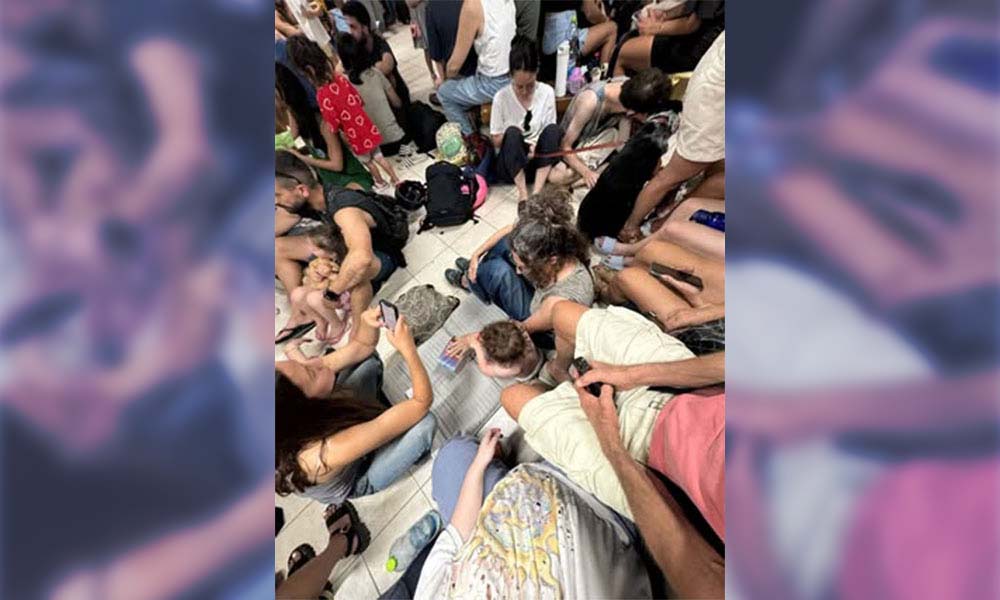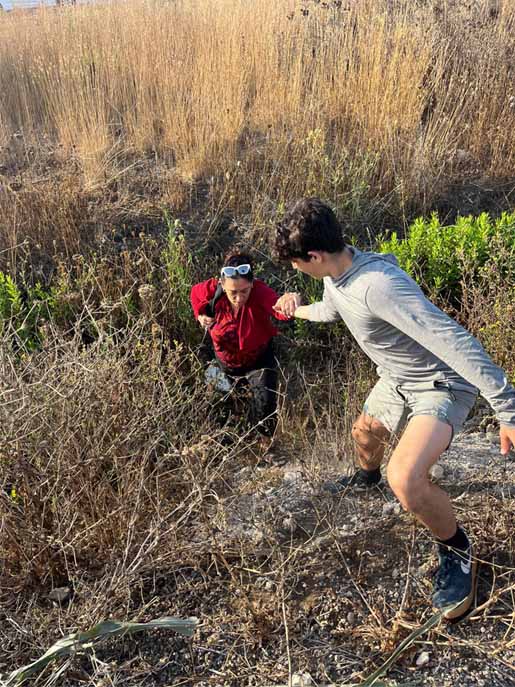
It’s 3 a.m. and there it is: that screechy, synthetic jangle from your phone that shakes you from your slumber and forces you out of bed. A present from Iran is headed in this direction—a barrage of ballistic missiles—and one of them just might have your name on it. It’s Israel’s Homefront Command sending out an alert, telling you to move closer to your safe space, and no, not the kind that cares about your feelings.
Soon a second, different kind of siren will sound, this one more urgent, coming not just through your phone but through the hidden loudspeakers of any populated area. Suddenly you feel like a walk-on in a WW II drama, with terrifying air-raid sirens blaring overhead, your legs carrying you quickly as you scurry underground into a small, windowless space—crammed in with people you don’t know. At unpredictable hours of day and night, you will find yourself scuttling into your safe room, with your family or close friends if you’re lucky—with neighbors or strangers in an old-fashioned shelter if less so—and someone will pull that heavy door shut in a way that reminds you of a chilling Twilight Zone episode. And then you wait for the booms, because it’s not just that you can hear them, but you can feel them, and you can’t but hope that those missiles are far away, and that they will fall in an open field.
This war changed Israel’s sense of shelter, literally and figuratively.
Except that this time, unlike in any other war in Israel’s history, plenty of them won’t. Of the more than 500 ballistic missiles that Iran launched at Israel after Israel’s surprise attack on June 13, 36 struck built-up environments such as apartment buildings or other civilian areas, including a power station and an oil refinery, leading to 28 deaths. More than 3,000 people were treated in hospitals, some 240 buildings were heavily damaged, and over 13,000 Israelis were displaced.
In short, this does not look at all like the previous wars Israel has been through. Iran’s medium-range ballistic missiles are more accurate and, when they make a direct impact, more devastating than anything Israel has faced in the past from Hamas and Hezbollah, with their Qassam and Katyusha rockets launched from Gaza and Lebanon. In this war, having a mamad or built-in shelter inside your home could save your life. But in cases where a building took a direct hit, such as in Bat Yam and Beersheva, a mamad was not nearly enough.
This is how I spent the last two weeks of my trip to Israel: scampering for shelter on a daily and nightly basis—and in one case having to ditch our car at the roadside and run for the fields when we were too far from any shelter at all. Everything fun was closed; museums, restaurants and most shops were shuttered, actual plans were a no-go zone. But we went to the beach anyway, because my sister-in-law wanted to spend her 50th birthday that way. Part of me wanted to veto this plan, and I know some of my husband’s family felt the same way: You don’t go out on the road unnecessarily in the middle of a war. But part of me loved my 83-year-old father-in-law’s response: Keep living your life and don’t sit at home in fear, because that’s what “they” want. And so we engaged in a forbidden dip in the Mediterranean, along with a few crazy surfers. I worry about how our kids will sound when their teachers ask how they spent their summer: braggadocious? morbid? Darkly nonchalant about vacationing in a war zone, not being able to leave if we wanted to, and feeling unsure of how and when we’d be able to get out?
Had I known Netanyahu would choose this moment to strike, I most certainly wouldn’t have chosen this June to take my family back to the country where my husband and I met, where he and our children were born, where I made a life for myself for 16 years before returning to the United States a decade ago. But no one knew that what Bibi had been talking about for some time—his refusal to accept a nuclear-armed Iran that threatens to wipe Israel off the map—was going to come to a crescendo while we were sleeping in our beds.
This war changed Israel’s sense of shelter, literally and figuratively. When my husband and I were searching for an apartment to buy in Jerusalem in 2012, the last thing on our list was whether it had a mamad. Scratch that: it wasn’t on our list at all, because it had been more than 20 years since Israel had required or needed these safe rooms—and even then, the main focus was whether there was an airtight seal in the case of a chemical-weapon attack from Iraq. In the one rental apartment we’d lived in that did have a mamad, we found it annoying: It was our kids’ room and the heaviness of the door seemed inconvenient. In short, I’d totally underestimated the value of a mamad—an acronym that stands for merkhav mugan dirati—literally, a protected residential space. When I passed a sign for a public shelter, it was as if pointed back in time, to crumbling relics of the past—something that would hardly be needed in the new Middle East. Until this war, my most memorable experience in a bomb shelter was when we had a dance party in a shelter when I was a student at Tel Aviv University in 1990. That, and the handful of times we descended with our children into our Jerusalem basement shelter during the 2014 war with Hamas, which of course looks almost insignificant in comparison to the times we live in now.
[PHOTOS: Life in the Safe Room]
Today, there is an incredible demand for buildings with shelters. Adding one to an existing home can cost upwards of $40,000, a price that hardly makes it accessible to the average Israeli. Other options, which include private mobile units or retrofitting existing rooms with blast-resistant doors, windows and walls, are almost as expensive, Ynet reports. While some of the wealthiest Israelis are building luxury shelters you wouldn’t mind spending some time in, equipped as they are with home movie theaters, bathrooms and showers, some 56 percent of Israeli dwellings have no in-house shelter, according to the Israel Builders Association. It’s not until you think twice about what kind of pajamas to wear to bed (you might be in public in them in a few hours) or whether you should take a shower just now (what are the chances that someone in Tehran will press the button in the next 15 minutes?) or need to rouse a teenager from a deep sleep to descend to a communal shelter that you understand how challenging it is to get through a war without a mamad.

The author’s son helps her out of a ravine in Israel after an incoming missile warning forced them off the road and out of their car to seek shelter. Used with permission.
For 12 days in June, during a trip we had planned long ago in order to spend time with family and friends in our erstwhile home, I experienced the full gamut: escaping into a safe room in my in-laws house in the Galilee; having to quickly descend several flights to the basement shelter—more like a little cement box—at my dear friends’ place in Jerusalem; and having to run to a public shelter with sirens blaring, which is a good way to discover that, yes, I can still run. (Or perhaps fear-jog. Is that a word?) As a family of four on the road—a necessity as my daughter and I had a ship to Cyprus to catch from the port of Ashdod—we also had the unenviable experience of being out on the open road during an incoming missile attack, which meant we had to follow the orders that by then had been drilled into our heads by the constant announcements on the radio and TV: Pull the car over, move away from it and lie down on the ground nearby, using your hands to cover your head. (No one ever explains this last part, but one can only guess that when it comes to flying explosives or shrapnel, the theory is that it’s better to lose a hand than a head.)
In this short but shattering war, we learned that having a mamad in your home is no guarantee of protection—many of this war’s victims died while sheltering in their own homes—and that the vaunted Iron Dome and Arrow are unable to destroy or otherwise neutralize every missile headed Israel’s way. Specifically, they managed to get about 86 percent of them. It’s not an entirely reassuring number. How you live (do you live in a “newer” building built after 1992, when the addition of a mamad was required?) and where you live (i.e., in a city on the coastal plain, in a rural area, Jerusalem) determined what kind of war you had—and in some cases, whether you survived.
Now comes the aftermath of this war that is said to have been planned for 20 years, yet took the public by surprise. Going forward, there will be a much greater emphasis on living with or near a shelter, and, one hopes, action toward better protecting the people who have far fewer shelters, such as Arab and Bedouin citizens, as well as all kinds of marginalized Jewish Israelis.
It’s also clear to all Israelis that in a ballistic missile attack, a mamad won’t save you if your building is the unlucky one that suffers a direct hit. Moreover, there are some important questions to ask about Israel’s ability to protect its citizens in a war such as this. On June 18 The Wall Street Journal reported that Israel had started running low on missile interceptors, though Israel denied those reports.
And so many of us are left with mixed feelings: Is Israel safer as a result of this war with Iran, or is the civilian population more vulnerable than ever? Was launching the June 13 attack a must, or could more have been achieved with diplomacy? If this was just a setback for Iran and not so destructive and definitive as President Trump would like us to believe, was it worth it? I want to believe the strategists who insist that it was, but I’m a journalist, so I’m naturally skeptical. And contrary to what I hear from some Israeli expats who say it’s wrong to question Israel if you don’t live there, I do have the right to be skeptical. I have a right to wish that we’d had a very different kind of visit to Israel, that the lives lost could be restored, that the thousands of people made homeless by this last chapter of war will get the aid they need and the ability, somehow, to go home again. I have a right to feel guilty about having escaped on a cruise ship while Palestinians were famished and under fire an hour from where we boarded, a right to feel haunted by the Israeli hostages still held in Gaza and a right to keep hoping that all the leaders of the region would make better choices—choices that could lead to true shelter.
Ilene Prusher is an award-winning journalist and novelist who covered Israel from the ground for 15 years for The Christian Science Monitor, Time, Haaretz, Moment and other publications. She returned to the states with her Israeli husband and two children in 2015 and now teaches journalism at Florida Atlantic University.
Top image: Israelis in a shelter, submitted via Facebook.


